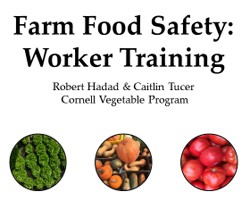Video Series: Essentials of Food Safety for Farmworkers

We all know that farm employees have many crucial roles on the farm, including carrying out food safety policies and practices. However, their ability to do that effectively, depends heavily on the quality of the training they receive. To meet the growing need for online, easily accessible resources, Robert Hadad and Caitlin Tucker have designed "Essentials of Food Safety for Farmworkers", a 5-part video series that covers many of the required worker training topics set forth by FSMA (the Food Safety Modernization Act), or other 3rd party auditing programs.
Part 1: Creating a Worker Training Program
In Part 1, farm employees and managers will learn about the importance of training farmworkers, topics that farmworkers should be trained on, considerations for training farmworkers, the role of the food safety manager, and resources available to managers to assist in training.
Part 2: Food Safety and Why it Matters
In Part 2, farm employees will learn 5 reasons we should care about food safety, the 3 types of pathogens that cause foodborne illnesses, the 5 routes of contamination on the farm, and potential food safety risks on the farm.
Part 3: Everyday Practices to Prevent Foodborne Illness
In Part 3, farm employees will learn about everyday practices that can reduce the risk of contaminating produce with foodborne pathogen, the steps of proper handwashing, when hands should be washed, the proper way to deal with injuries, and symptoms of foodborne illnesses.
Part 4: Reducing Food Safety Risks on the Farm
In Part 4, employees will learn the difference between cleaning and sanitizing and how to effectively do both, possible risks throughout production areas, wash/pack facilities, storage, and transportation, and steps farmworkers should take if they find a risk they cannot mitigate.
Part 5: Spot the Risk - A Series of Case Studies
In Part 5, employees will be introduced to possible scenarios containing food safety risks, learn why the scenario contains a food safety risk, learn about immediate actions they can take to minimize the risks, and learn about future changes that can be made to prevent the risk from happening again.
Transcript: Part I - Creating a Worker Training Program (pdf; 235KB)
Transcript: Part 2 - Food Safety and Why it Matters (pdf; 370KB)
Transcript: Part 3 - Everyday Practices to Prevent Foodborne Illness (pdf; 315KB)
Transcript: Part 4 - Reducing Food Safety Risks on the Farm (pdf; 461KB)
Transcript: Part 5 - Spot the Risk - A Series of Case Studies (pdf; 371KB)

Upcoming Events
Vegetable Pest and Cultural Management Field Meeting for Auction Growers -- Ontario Produce Auction
July 15, 2025
Stanley, NY
This evening meeting will demonstrate pest management in fresh market vegetables in both field and greenhouse (high tunnel) vegetables, primarily for those growing for wholesale auction. A hands-on demonstration of weed, insect and disease identification in vegetables including management options. Details on each topic will focus on field observations at the farm.
Orleans Summer Vegetable Meeting, 2025
July 16, 2025
Waterport, NY
Meeting themes are pest management in a wide array of produce and best practices for pesticide use. Professor Brian Nault will cover allium leaf miner and thrips in onions, garlic, and leeks, and discuss insect challenges in other crops. Bring your questions! We'll also have a field walk that includes high tunnel tomato and cucumber.
DEC credits available: 0.5 in CORE plus either 1.25 in 1a and 23, or 0.75 in 24.
Vegetable Pest and Cultural Management Field Meeting for Auction Growers -- Finger Lakes Produce Auction
July 18, 2025
Penn Yan, NY
This evening meeting will demonstrate pest management in fresh market vegetables in both field and greenhouse (high tunnel) vegetables, primarily for those growing for wholesale auction. A hands-on demonstration of weed, insect and disease identification in vegetables including management options. Details on each topic will focus on field observations at the farm.


































